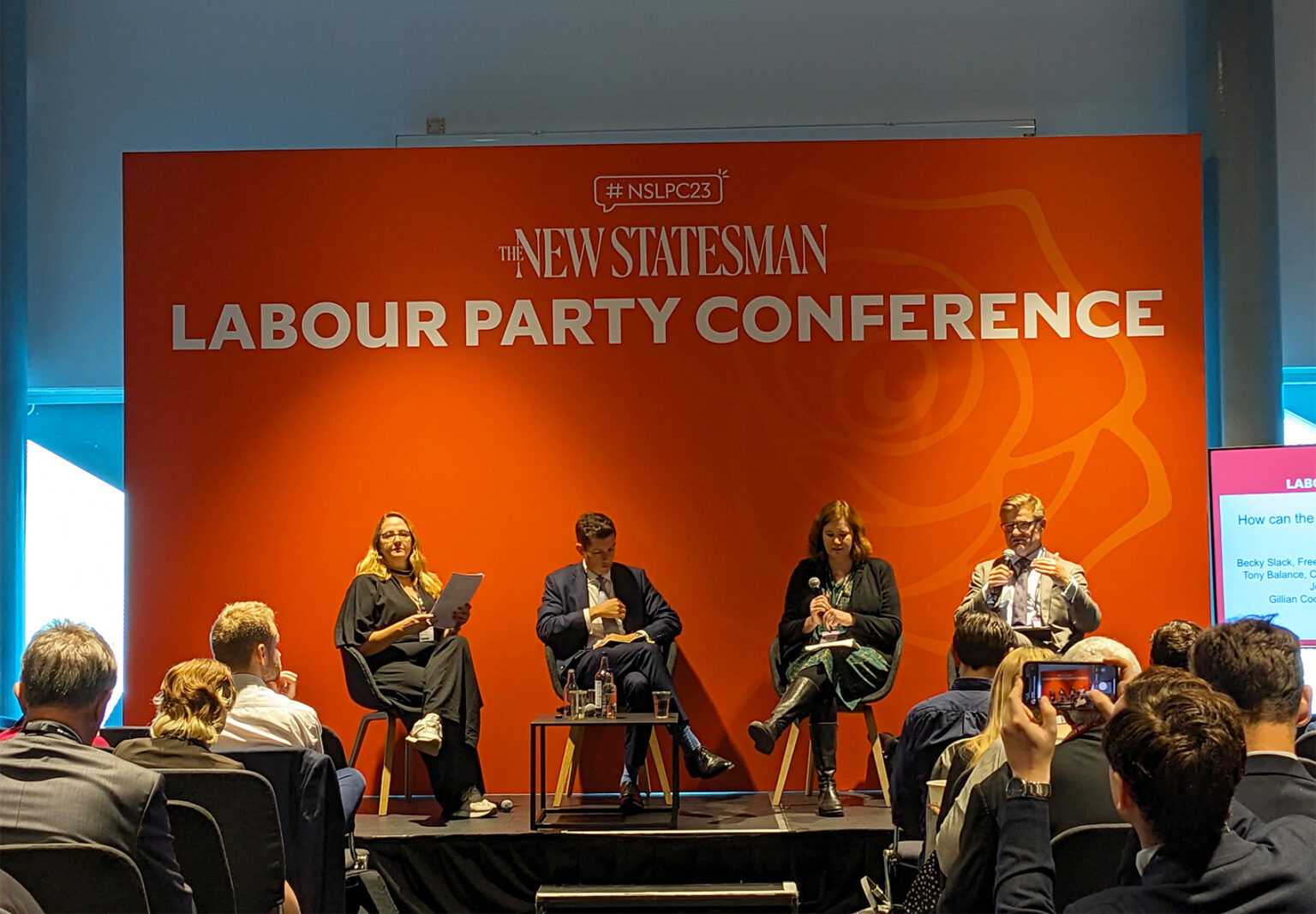LIVERPOOL – A senior executive at the UK’s largest gas distributor has been accused of lobbying to slow down climate action after pushing for the use of hydrogen in heating at a Labour Party conference panel on net zero.
Tony Ballance, Cadent’s chief strategy and regulation officer, told a packed event on Monday to ignore a growing body of scientific evidence that finds the fuel to be expensive, resource intensive and inefficient at heating homes.
Emails previously revealed by DeSmog show how the hydrogen lobby is now targeting Labour – which has been hosting its annual conference in Liverpool since Sunday – as the party most likely to win the next general election.
Cadent, the sponsor of the New Statesman event that hosted Ballance, distributes gas to 11 million homes and businesses in the UK. Gas boilers are used to heat around 85 percent of UK homes, which together produce 14 percent of the UK’s greenhouse gas emissions.
The rapid roll-out of electricity-powered heat pumps to replace gas heating is seen as essential for the UK to reach net zero targets by 2050. Hydrogen, while widely seen as important for decarbonising industrial processes such as steel and concrete manufacture, is not seen by the vast majority of scientists to have a major future role in heating homes.
The gas industry has championed hydrogen as a replacement for gas in heating, arguing that it can easily replace existing methane gas and can use existing pipelines to transport and store the fuel.
However, a study published this year found heat pumps to be two to three times more efficient than oil and gas based fossil heating systems, even in cold and sub-zero temperatures. It is one of over 40 studies that find hydrogen should only ever play a “limited and complementary role” in heating.
Addressing a question from DeSmog about whether Cadent had taken these studies into account, Ballance claimed that the evidence was “limited”, and encouraged policymakers to consult “more authoritative sources” – such as gas boiler manufacturers.
DeSmog previously revealed that a major gas industry group had paid a PR firm to drum up opposition to heat pumps in the UK press – and promote hydrogen instead.
In response to Ballance’s claim at the Labour Party conference, Richard Lowes, a heating specialist at the Regulatory Assistance Project (RAP), accused Cadent of lobbying “to protect their investment and slow down climate action”.
“This is all about lobbying MPs to try and convince them that gas has a future, when the evidence shows it doesn’t,” Lowes told DeSmog.
“The more we learn about using hydrogen for heating, the worse the evidence gets: it is more expensive, extremely inefficient and unsustainable. Together these make it seem very unlikely it will come to anything.”
‘Twee’ Argument
Cadent was one of two gas networks to win a government contract to trial hydrogen for home heating ahead of the government’s decision on the policy, expected in 2026. But plans for the village of Whitby in Cheshire were scrapped in July after a sustained local campaign, which raised concerns over the safety of hydrogen in homes.
In response, then Energy Secretary Grant Shapps indicated that the government was poised to drop plans to replace home gas boilers with hydrogen alternatives.
However, the gas industry is still pushing for a role for hydrogen. Ballance said: “Now as many of you know, there was considerable opposition to the [Whitby] trial… not helped by an anti-hydrogen lobby coming to town, whipping up the anti-hydrogen campaign.”
Despite the considerable and sustained concerns over the safety and environmental impact of hydrogen, Ballance said there “wasn’t opposition” to hydrogen in Whitby – rather, “it was opposition to being forced” into the trial.
In answer to DeSmog’s question about scientific studies showing the inefficiency of hydrogen for heating, Ballance said: “Frankly.. When you scratch the surface.. Frankly it doesn’t pass.”
He said: “You [should] talk to the boiler manufacturers who have the technology and they’re looking at this. You have to scratch below the surface rather than someone just counting up studies and wanting to see things in studies that are actually sometimes misrepresented. It’s about not seeing this [hydrogen versus heat pumps debate] as some kind of twee argument and being really serious about this.”
An investigation by DeSmog found that the Energy and Utilities Alliance (EUA), which represents the vast majority of the UK’s gas boiler manufacturers and distributors – including Cadent – had paid for an extensive negative PR campaign to “spark outrage” against heat pumps in the British press.
Along with other regional gas distributors, Cadent has been advocating for hydrogen via a campaign called Hello Hydrogen, which was launched in October 2022 to “raise awareness of hydrogen gas for heating our homes and calling on the government to commit to a hydrogen future”.
At the event on Monday, Ballance also argued that some of the scientific studies “were in Brazil and California, where it’s not surprising – gas is not going to be the preferred source of heating in much hotter, different countries”.
Richard Lowes told DeSmog that while not all of the studies covered by the academic analysis referred to the UK, many of them do.
“The same outcomes from around the world show that hydrogen will have a limited role in heating and that should reinforce what a terrible idea it is,” he said.
“To my knowledge, no UK study [which is] based on hitting the UK’s net zero climate targets, has ever shown anything more than a marginal role for hydrogen.”
Subscribe to our newsletter
Stay up to date with DeSmog news and alerts







